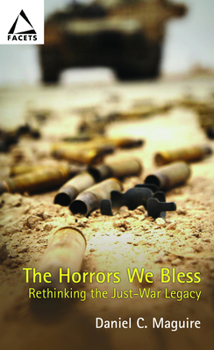The Horrors We Bless: Rethinking the Just-War Legacy
Is war inevitable? Is it so woven into the fabric of our beingthat it always was and always will be? "Early Christians,"says Maguire, "were unanimous in opposing this view." Theydidn't see war as normal but an outrage and even a sacrilege.Maguire argues that later Christians succumbed to thesupposed "normalcy" of war and developed what later becameknown as the "just-war theory," which was actually devised asa deterrent to the rush to war.
Format:Paperback
Language:English
ISBN:0800638972
ISBN13:9780800638979
Release Date:February 2007
Publisher:Fortress Press
Length:112 Pages
Weight:1.45 lbs.
Dimensions:0.3" x 5.0" x 7.1"
Customer Reviews
3 ratings
Un-justifying the Just-War Theory
Published by Thriftbooks.com User , 16 years ago
This book is very small and short (89 pgs), but that's all it needs to be. Daniel C. Maguire does a great job of outlining the hypocrisy of our modern, Western-world view of Just-war. While Maguire brings up the fact that early Christians were entirely pacifist, the book is less about religion, and more about the logic behind Just-war theory. And he's not advocating extreme pacifism at all costs. On the contrary, he is entirely behind the notion of defensive force...but only by strict criteria: Criterion 1. Just Cause: "The only just cause is defense against unjust attack." Criterion 2. Declaration by Competent Authority: Declaration of war can only be administered by a democratically elected body of government (i.e. Congress). "Police" actions dictated by the President alone is not Competent Authority because it may not truly represent the will of the people and is seldom up for debate. Criterion 3. Right Intention: "Right intention: insists that the "just cause" you allege for going to war is really why you are going to war. In other words, the just cause must truly be just and not just a mask for oil or conquering. Criterion 4. The Principle of Discrimination and Noncombatant Immunity: essentially this means - you cannot intentionally target civilians in war. In the modern era, however, this is very difficult since terrorists/guerillas are merged within the population. Therefore, if you cannot conduct war against terrorists/guerillas without killing civilians, then your war does not fit this criterion and must be abandoned. Criterion 5. Last Resort: War must be a last resort. However, the US "defense" budget is the largest funded budget we have. Our wallet tells us our hearts go to war before any other options first. Criterion 6. The Principle of Proportionality: The violence of war must do more good than harm. But as weapons grow in power, this option is becoming less and less viable. In summary, Maguire points out the curious role our Western world is in: when going to war, why is the burden of proof on the pacifist when the burden of proof should be on the ones calling for war? In other words, why are the hawks given plenty of room to rally the country for their cause when the doves are silenced and looked down upon? Shouldn't this be the other way around? Shouldn't the hawks always be the minority and have the burden of proof to go to war entirely on their shoulders? Why must the doves fight so hard to stop the war machine when war should always be the final option?
Excellent Read
Published by Thriftbooks.com User , 16 years ago
This is an excellent presentation on the subject of the "just war" theory and how it has been consistently violated in the Iraq war. Though the subject could easily become complex and scholarly, the author makes it highly readable for anyone.
Thorough, Concise, Provocative
Published by Thriftbooks.com User , 16 years ago
"The Horrors We Bless: Rethinking the Just-War Legacy" Daniel Maguire, Professor of Moral Theological Ethics at Marquette University, aims "to challenge the seductive power of war that so grips and hobbles our imaginations." A major cause, he argues, is "Just-war" Theory. Its original purpose -- to limit, control, and even avoid warfare -- now is commonly subverted to justify and "baptize" it. The burden of proof intended to rest upon the warrior now rests upon the conscientious objector. Maguire has the gift of truth-telling in such a way that you can see. Noting how we have sanitized the idea of war, Maguire observes: "War can even be a form of armchair spectator entertainment. It is acceptable for people to become 'Civil War buffs,' or 'Revolutionary War buffs.' If people were to announce themselves as 'prostitution buffs' or 'necrophilia buffs,' their perverted absorption in such human disasters would raise eyebrows." Rightly used, Just-war theory would insist that international force be deployed only "in a community context with legal and internationally enforceable restrictions comparable to the restraints we put upon our police." [italics in original] Maguire has hope: "It is in us to outgrow war. The formula is easy enough: put your main trust in justice, not weapons, trust life-power more than kill-power, specialize in diplomacy and imagination, not bludgeoning." Grounds for hope abound: "Military power, even 'superpower' military power, is being embarrassed [by its failure to assure peace], and examples of successful nonviolent modes of resistance are multiplying." Maguire calls us to "the hard work of prophetic citizenry," particularly during times like post-9/11, when "a White House spokesman noted that the president 'considers any opposition to his policies to be no less than an act of treason.' " Excellent for study groups: a good read, thoroughly documented in history and scriptures, inexpensive, and concise -- eighty-nine 4 x 7-inch packed and provocative pages.




